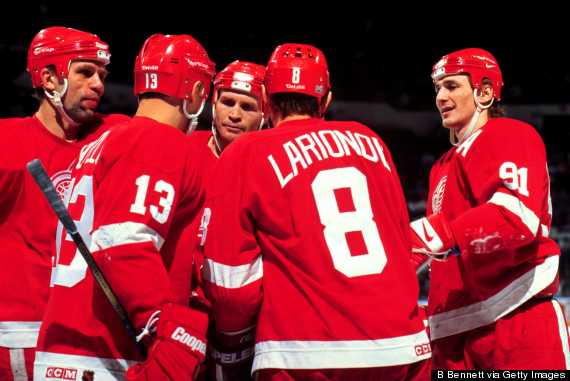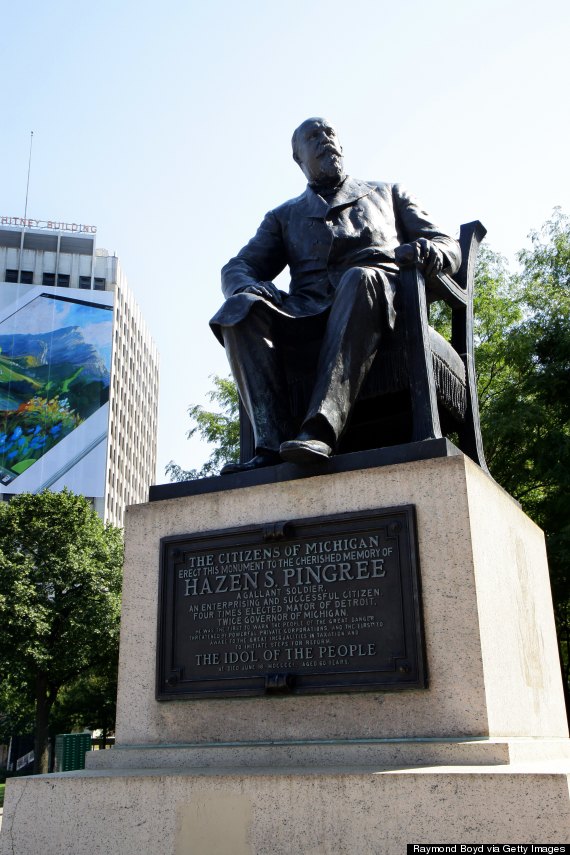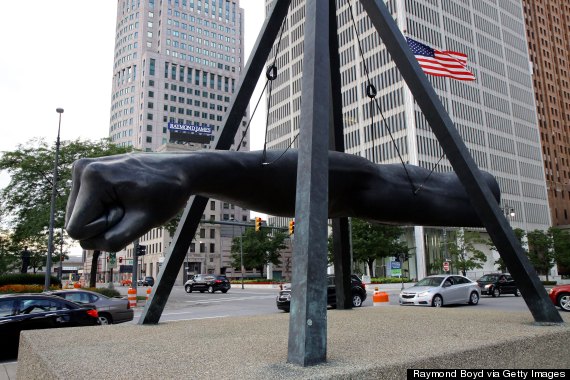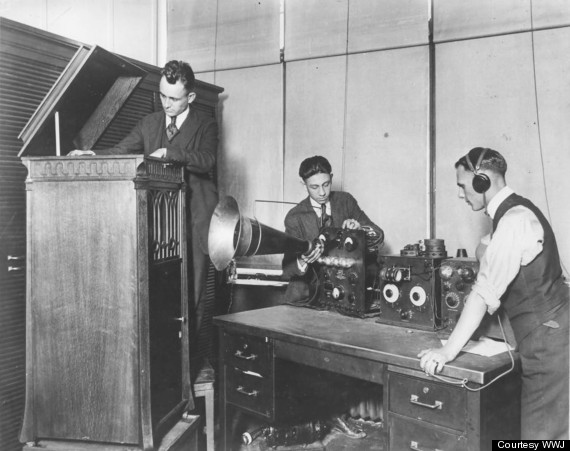HuffPost's Good News USA series showcases both past and present ways cities across the country have created a positive impact worldwide and within their own communities.
The 2013 version of Detroit may be bankrupt and beginning to rebuild, but the city is drawing from its tremendous wealth of history as it looks ahead. From music and industry to sports and invention, Detroit has led the way since being founded by explorer Antoine Laumet de la Mothe, sieur de Cadillac in 1701. The city's geographic location on the Detroit River helped the settlement grow into a thriving fur-trapping and trade hub.
Detroit's contributions to American and international history are significant, in part because of its shared border with the Canadian city of Windsor. Detroit was the last stop for many slaves who passed through the Underground Railroad to freedom in Canada. That border also made Detroit a natural center for hatching liquor-running schemes during Prohibition.
Here are 11 incredible ways Detroit has changed the world for the better.
1. When Martin Luther King Jr. previewed the "I Have A Dream" speech.
![detroit freedom march]()
Before the March on Washington, 25,000 Detroiters gathered in Cobo Hall to hear a preview of Martin Luther King Jr.’s "I Have a Dream" speech on June 23, 1963. Known as the "Detroit Walk to Freedom," MLK Jr. marched down Woodward Avenue with Walter Reuther, the Reverend C.L. Franklin and 125,000 other civil rights believers. For the 50th anniversary in June 2013, thousands gathered to walk down Woodward Avenue in remembrance. Wendell Anthony, Detroit NAACP president, told WJBK that the march signified "that the work for freedom and justice must continue."
2. When the Red Wings won the first Stanley Cup in 42 years.
![russian five detroit red wings]()
The Detroit Red Wings' journey to back-to-back Stanley Cup championships in 1997 and 1998 ended one of the longest cup droughts in NHL history. A million people showed up to celebrate the team at a parade down Woodward Avenue in 1997. The Red Wings' first championship in 42 years gave some credence to the nickname "Hockeytown," that Detroit had adopted. It set the stage for greatness behind the Red Wings bench and on the ice (22 straight playoff appearances!), leading some to dub them the greatest franchise in pro sports. The team's integration of European and Soviet-style hockey strategies, best expressed by the famous Russian Five lineup, led the push to make hockey a truly international game.
3. When Hazen S. Pingree's potato patch inspired the nation to feed the hungry.
![hazen pingree]()
He was the greatest mayor Detroit would ever know. Hazen S. Pingree, an avowed social reformer and enemy of major corporations and monopolies, fought during his 1890-1897 tenure to expose corruption and negotiate fair costs for Detroiters. But Pingree is best remembered for his potato patch. The Panic of 1893 hit Detroit hard, and by late 1894, there was no money left to care for the poor. Pingree mounted an unprecedented public works campaign and opened the city’s massive holdings of vacant land for garden plots and potato patches. "Pingree’s potato patches broke the back of hunger," the Detroit Free Press later wrote, according to Historic Detroit. "They were nationally acclaimed and copied. They revealed a city of boundless energy and industry unwilling to live on doles."
4. When Berry Gordy dreamed up a record company that would spread the Motown Sound to the world.
In 1959, a songwriter named Berry Gordy had already written a number of hits for Jackie Wilson. But he still didn't have the financial means to open his own business, Gordy told "Oprah’s Master Class" last year. He asked his family for $1,000, but they could only afford $800. That modest sum bought the small photo studio on Detroit’s Grand Blvd. that the world came to know as "Hitsville USA" -- home to Motown Records, and dozens of hit singles by the Temptations, the Supremes, Marvin Gaye, the Jackson 5 and more.
5. When Diego Rivera's industry murals challenged the status quo.
![diego rivera detroit mural]()
Diego Rivera's bold, vivid frescoes helped establish the Mexican mural movement in the United States, and his public art-making became the biggest inspiration for Franklin Roosevelt's WPA program during the Depression. It was the political messages entwined with the murals that made Rivera, husband of Frida Kahlo, such a controversial figure in American art. He was an avowed atheist and Marxist; these views led one of his murals to be removed from New York City's Rockefeller Center. Rivera painted his 27-panel mural at the Detroit Institute of Arts over 11 months in 1932 and 1933. His meditations on industry and its consequences, along with his portrayal of workers, are considered the artist's greatest American work, though it was condemned as pornographic and sacrilegious. Although Edsel Ford was pressured to remove the mural, he refused. During the height of McCarthyism, a sign was hung in Rivera Court condemning the artist's views but championing the murals.
6. When the city honored the first African-American national hero.
![joe louis fist detroit]()
This 8,000-pound, 24-foot-long sculpture of Joe Louis' fist sits proudly in the center of the city. Joe Louis was the heavyweight champion of the world from 1937 to 1950 and is regarded as one of the first African-American national heroes. "The Fist" has become a symbol of pride and determination for the people of Detroit. It was paid for by a $350,000 commission from Sports Illustrated magazine and was sculpted by Robert Graham.
7. When the "Bad Boy era" made physical basketball an acceptable practice.
The Pistons hit the jackpot when they scored the #2 pick in the 1981 NBA draft: Isiah Thomas, who would go on to become one of the greatest NBA point guards. They then hired Chuck Daly as head coach in 1983, guiding the team to back-to-back championships in 1989 and 1990. Thomas and Daly led the Pistons into what is referred to as the "Bad Boy era," which changed the way athletes imposed their will on the competition. For the first time in basketball history, players were using strength, brute force and intimidation to dominate their opponents. "Detroit has my basketball soul and is a city that has always persevered against the odds," Thomas told The Huffington Post. "Detroit is a city that has impacted the world through its music, sports and motor vehicles. I love Detroit!"
8. When a young inventor (Henry Ford) founded his own automobile company.
![henry ford detroit automobile company]()
A young Henry Ford assembled his first engine-powered vehicle, the Quadricycle, in secret at his rented home on Bagley Avenue. Three years later, in 1899, Ford founded the Detroit Automobile Company, an automobile manufacturer, with backing from investors. The company closed down January 1901, but it didn’t take long for Ford’s idea to make a comeback. It was reorganized into the Henry Ford Company on Nov. 30, 1901, changing the automobile industry forever.
9. When three kids helped make the city the birthplace of techno.
![movement festival]()
Techno may have taken over the world, but like Motown music, it was invented in Detroit. Juan Atkins, Derrick May and Kevin Saunderson were high school friends who became known locally as "The Belleville Three," for their work shaping and building electronic music. The techno they helped create is more than a genre: it's a sonic perspective exploring the post-industrial city and the future it holds. Electronic music still takes center stage every summer at the annual Movement festival downtown.
10. When Detroit paved its way to a better future.
![Hosted by imgur.com First City to Pave a Concrete Road]()
Not only was Detroit known for automobiles, but it also created the first mile of concrete highway in the nation in 1909. It cost $13,537 and ran on Woodward Avenue between Six and Seven Mile roads. Detroit paved the way for other states to build concrete highways: Road builders came from everywhere to see how the concrete held up after a substantial number of cars drove on it. The nation's first four-way electric traffic light was at the corner of Woodward and Michigan Avenues in Detroit. The light was the invention of Detroit police officer William Potts.
11. When the first regularly scheduled programs were broadcast over the radio.
![first radio broadcast]()
While there is debate surrounding who started the nation's first radio station, Detroit's 8MK was founded on Aug. 20, 1920, and claims to be the first radio station to broadcast regularly scheduled news reports, as well as religious broadcasts and play-by-play sports reports. Founded by the Scripps family and licensed to the Detroit Evening News, it was later renamed WWJ.
The 2013 version of Detroit may be bankrupt and beginning to rebuild, but the city is drawing from its tremendous wealth of history as it looks ahead. From music and industry to sports and invention, Detroit has led the way since being founded by explorer Antoine Laumet de la Mothe, sieur de Cadillac in 1701. The city's geographic location on the Detroit River helped the settlement grow into a thriving fur-trapping and trade hub.
Detroit's contributions to American and international history are significant, in part because of its shared border with the Canadian city of Windsor. Detroit was the last stop for many slaves who passed through the Underground Railroad to freedom in Canada. That border also made Detroit a natural center for hatching liquor-running schemes during Prohibition.
Here are 11 incredible ways Detroit has changed the world for the better.
1. When Martin Luther King Jr. previewed the "I Have A Dream" speech.

Before the March on Washington, 25,000 Detroiters gathered in Cobo Hall to hear a preview of Martin Luther King Jr.’s "I Have a Dream" speech on June 23, 1963. Known as the "Detroit Walk to Freedom," MLK Jr. marched down Woodward Avenue with Walter Reuther, the Reverend C.L. Franklin and 125,000 other civil rights believers. For the 50th anniversary in June 2013, thousands gathered to walk down Woodward Avenue in remembrance. Wendell Anthony, Detroit NAACP president, told WJBK that the march signified "that the work for freedom and justice must continue."
2. When the Red Wings won the first Stanley Cup in 42 years.

The Detroit Red Wings' journey to back-to-back Stanley Cup championships in 1997 and 1998 ended one of the longest cup droughts in NHL history. A million people showed up to celebrate the team at a parade down Woodward Avenue in 1997. The Red Wings' first championship in 42 years gave some credence to the nickname "Hockeytown," that Detroit had adopted. It set the stage for greatness behind the Red Wings bench and on the ice (22 straight playoff appearances!), leading some to dub them the greatest franchise in pro sports. The team's integration of European and Soviet-style hockey strategies, best expressed by the famous Russian Five lineup, led the push to make hockey a truly international game.
3. When Hazen S. Pingree's potato patch inspired the nation to feed the hungry.

He was the greatest mayor Detroit would ever know. Hazen S. Pingree, an avowed social reformer and enemy of major corporations and monopolies, fought during his 1890-1897 tenure to expose corruption and negotiate fair costs for Detroiters. But Pingree is best remembered for his potato patch. The Panic of 1893 hit Detroit hard, and by late 1894, there was no money left to care for the poor. Pingree mounted an unprecedented public works campaign and opened the city’s massive holdings of vacant land for garden plots and potato patches. "Pingree’s potato patches broke the back of hunger," the Detroit Free Press later wrote, according to Historic Detroit. "They were nationally acclaimed and copied. They revealed a city of boundless energy and industry unwilling to live on doles."
4. When Berry Gordy dreamed up a record company that would spread the Motown Sound to the world.
In 1959, a songwriter named Berry Gordy had already written a number of hits for Jackie Wilson. But he still didn't have the financial means to open his own business, Gordy told "Oprah’s Master Class" last year. He asked his family for $1,000, but they could only afford $800. That modest sum bought the small photo studio on Detroit’s Grand Blvd. that the world came to know as "Hitsville USA" -- home to Motown Records, and dozens of hit singles by the Temptations, the Supremes, Marvin Gaye, the Jackson 5 and more.
5. When Diego Rivera's industry murals challenged the status quo.

Diego Rivera's bold, vivid frescoes helped establish the Mexican mural movement in the United States, and his public art-making became the biggest inspiration for Franklin Roosevelt's WPA program during the Depression. It was the political messages entwined with the murals that made Rivera, husband of Frida Kahlo, such a controversial figure in American art. He was an avowed atheist and Marxist; these views led one of his murals to be removed from New York City's Rockefeller Center. Rivera painted his 27-panel mural at the Detroit Institute of Arts over 11 months in 1932 and 1933. His meditations on industry and its consequences, along with his portrayal of workers, are considered the artist's greatest American work, though it was condemned as pornographic and sacrilegious. Although Edsel Ford was pressured to remove the mural, he refused. During the height of McCarthyism, a sign was hung in Rivera Court condemning the artist's views but championing the murals.
6. When the city honored the first African-American national hero.

This 8,000-pound, 24-foot-long sculpture of Joe Louis' fist sits proudly in the center of the city. Joe Louis was the heavyweight champion of the world from 1937 to 1950 and is regarded as one of the first African-American national heroes. "The Fist" has become a symbol of pride and determination for the people of Detroit. It was paid for by a $350,000 commission from Sports Illustrated magazine and was sculpted by Robert Graham.
7. When the "Bad Boy era" made physical basketball an acceptable practice.
The Pistons hit the jackpot when they scored the #2 pick in the 1981 NBA draft: Isiah Thomas, who would go on to become one of the greatest NBA point guards. They then hired Chuck Daly as head coach in 1983, guiding the team to back-to-back championships in 1989 and 1990. Thomas and Daly led the Pistons into what is referred to as the "Bad Boy era," which changed the way athletes imposed their will on the competition. For the first time in basketball history, players were using strength, brute force and intimidation to dominate their opponents. "Detroit has my basketball soul and is a city that has always persevered against the odds," Thomas told The Huffington Post. "Detroit is a city that has impacted the world through its music, sports and motor vehicles. I love Detroit!"
8. When a young inventor (Henry Ford) founded his own automobile company.

A young Henry Ford assembled his first engine-powered vehicle, the Quadricycle, in secret at his rented home on Bagley Avenue. Three years later, in 1899, Ford founded the Detroit Automobile Company, an automobile manufacturer, with backing from investors. The company closed down January 1901, but it didn’t take long for Ford’s idea to make a comeback. It was reorganized into the Henry Ford Company on Nov. 30, 1901, changing the automobile industry forever.
9. When three kids helped make the city the birthplace of techno.

Techno may have taken over the world, but like Motown music, it was invented in Detroit. Juan Atkins, Derrick May and Kevin Saunderson were high school friends who became known locally as "The Belleville Three," for their work shaping and building electronic music. The techno they helped create is more than a genre: it's a sonic perspective exploring the post-industrial city and the future it holds. Electronic music still takes center stage every summer at the annual Movement festival downtown.
10. When Detroit paved its way to a better future.

Not only was Detroit known for automobiles, but it also created the first mile of concrete highway in the nation in 1909. It cost $13,537 and ran on Woodward Avenue between Six and Seven Mile roads. Detroit paved the way for other states to build concrete highways: Road builders came from everywhere to see how the concrete held up after a substantial number of cars drove on it. The nation's first four-way electric traffic light was at the corner of Woodward and Michigan Avenues in Detroit. The light was the invention of Detroit police officer William Potts.
11. When the first regularly scheduled programs were broadcast over the radio.

While there is debate surrounding who started the nation's first radio station, Detroit's 8MK was founded on Aug. 20, 1920, and claims to be the first radio station to broadcast regularly scheduled news reports, as well as religious broadcasts and play-by-play sports reports. Founded by the Scripps family and licensed to the Detroit Evening News, it was later renamed WWJ.